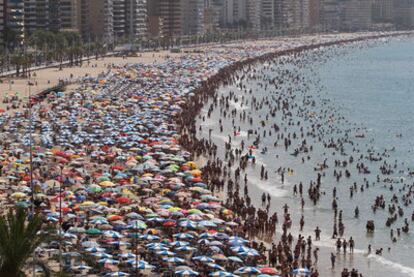Traditional sun-and-sand holidays in Spain are back in vogue with foreigners
Output in the tourist sector forecast to triple that of broad economy this year
"If we could have put up 100 portable rooms here on the side of the building, we would have had them full throughout Easter," says one of the managers at the four-star Hotel Jacaranda in a resort in Tenerife.
Upbeat reports like this have been common of late in Spain's tourist industry. As the country struggles to emerge from its worst financial crisis in decades - the worst is over but there are no great things on the horizon - tourism is keen to re-establish itself as the goose that lays the golden eggs, and this is particularly apparent in the seaside holiday sector.
Spain is enjoying the offshoot of the uprisings in Arab countries such as Tunisia and Egypt, which have diverted tourists and helped fuel recovery in the Spanish industry. The main beneficiary of this has been the Canary Islands where overseas demand has been strong at the start of this year. Coastal areas have reported occupancy rates of close to 100 percent over Easter and the forecasts of the hotel sector have improved for the first time in three years.
Arrivals are up in first quarter as Italians, Scandinavians and Dutch flock to Spain
The domestic market continues to account for half of total demand
Exceltur, the industry's biggest lobby group, say that market players have now raised their expectation for sector growth in 2011 to 2.2 percent, up from 1 percent. The figure is nearly a full point above the government's 1.3 percent growth forecast for the overall economy this year. The state's estimate is three times higher than predictions by other expert bodies, who predict more modest GDP growth of around 0.8 percent.
According to Exceltur, the tourism sector's output rose 2.4 percent in the third quarter. The figure tallies with those from the Tourism and Trade Industry's Frontur survey that put the number of foreign arrivals at 3.6 million in March, a 0.6 percent increase on the previous year. This follows annual rises of 4.7 percent in January and 4.3 percent in February. For the first quarter overall, the number of visitors was up 2.9 percent at 9.1 million.
The number of visits from Spain's biggest markets, Britain and Germany, stayed low in the first three months of the year, but that was more than offset by a jump in visitors from Scandinavia and Italy of 11.7 and 10.9 percent respectively. Spain's popularity also shot up with the Dutch and Belgians whose numbers climbed by a fifth.
Those figures were backed by data also released Monday by the National Statistics Institute (INE), which showed the number of overnight stays in hotels by non-residents had risen 13.5 percent to 7.7 million as the occupancy rate improved 4.5 percentage points from a year earlier to 46.3 percent. Average revenues per room also picked up despite a 1.0-percent fall in prices.
Significantly, however, overnight stays by Spaniards in March declined 4.5 percent, reflecting high unemployment, heavy household debt, and a fall in purchasing power. "It should not be forgotten that the domestic market continues to account for half of total demand and Spain has been in a situation of stagnation or decline since the crisis broke," says Exceltur's vice chairman, José Luis Zoreda.
The tourism industry is hugely important to the Spanish economy, accounting for about 10 percent of its GDP. It is also a significant source of employment, but analysts say it is too early to tell if the surge in visitors has created enduring jobs or a pick-up in seasonal hiring.

Tu suscripción se está usando en otro dispositivo
¿Quieres añadir otro usuario a tu suscripción?
Si continúas leyendo en este dispositivo, no se podrá leer en el otro.
FlechaTu suscripción se está usando en otro dispositivo y solo puedes acceder a EL PAÍS desde un dispositivo a la vez.
Si quieres compartir tu cuenta, cambia tu suscripción a la modalidad Premium, así podrás añadir otro usuario. Cada uno accederá con su propia cuenta de email, lo que os permitirá personalizar vuestra experiencia en EL PAÍS.
¿Tienes una suscripción de empresa? Accede aquí para contratar más cuentas.
En el caso de no saber quién está usando tu cuenta, te recomendamos cambiar tu contraseña aquí.
Si decides continuar compartiendo tu cuenta, este mensaje se mostrará en tu dispositivo y en el de la otra persona que está usando tu cuenta de forma indefinida, afectando a tu experiencia de lectura. Puedes consultar aquí los términos y condiciones de la suscripción digital.








































